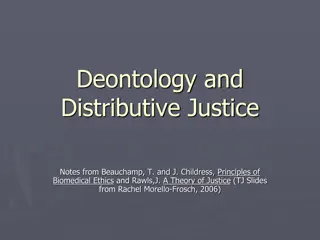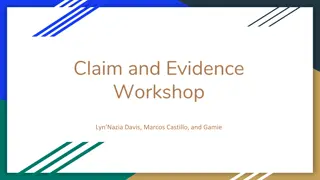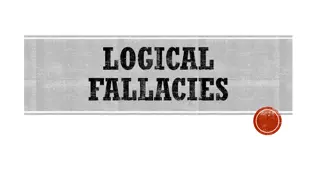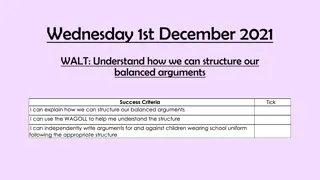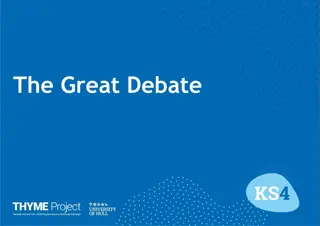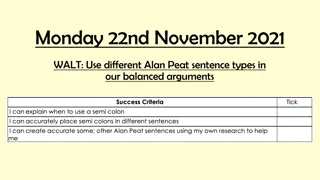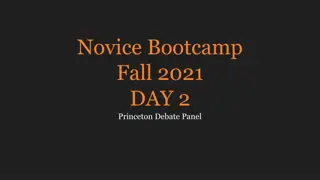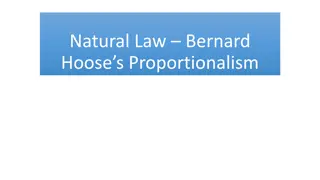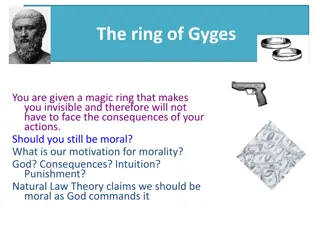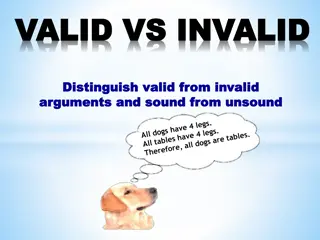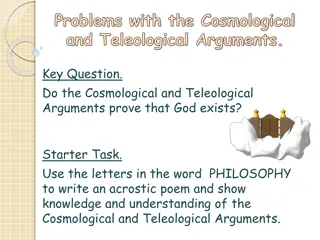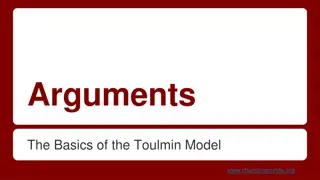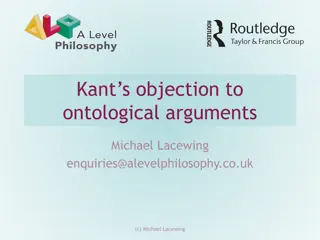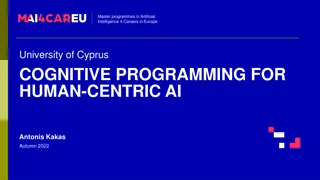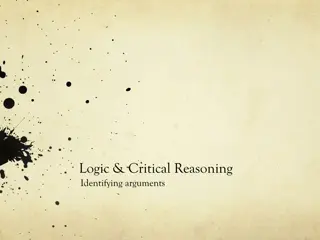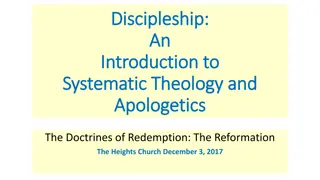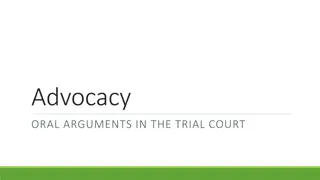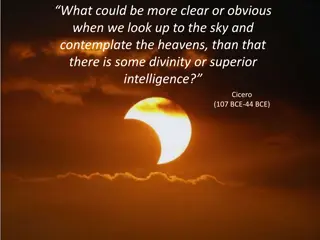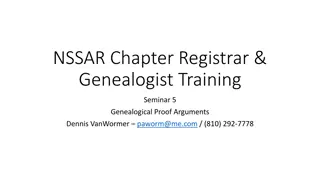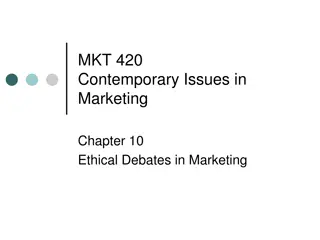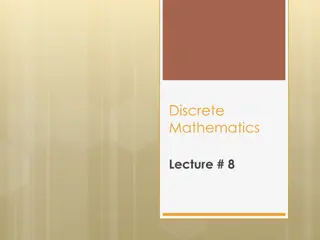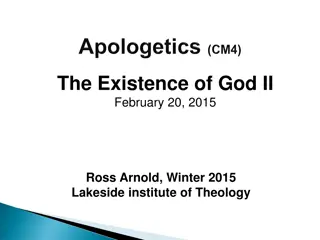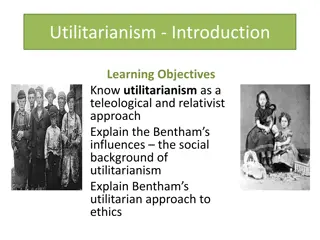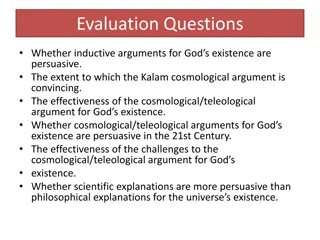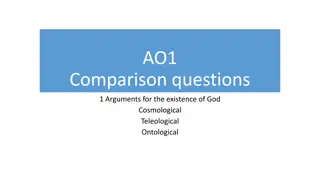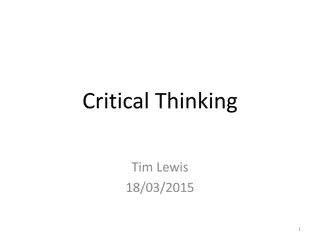Approaches in Studying Human-Environment Relationship
Explore different approaches to understanding the dynamic relationship between humans and their environment, including deterministic, teleological, possibilistic, and economic deterministic perspectives. These approaches shed light on how human actions and interactions with the environment have evol
1 views • 9 slides
Debate on Driving Skills: Are Women Better Drivers Than Men?
In this lesson students examine the debate on whether women make better drivers than men. The essay explores different perspectives, highlighting qualities such as patience and responsibility in women that may contribute to safer driving. Conversely, arguments against women drivers focus on perceive
2 views • 12 slides
Understanding Deontology and Distributive Justice in Ethics
Deontology, originating from the Greek words for duty and study of, focuses on morally required, forbidden, or permitted choices. It emphasizes obedience to duty and opposes utilitarianism, prioritizing what is morally right over the overall good. Unlike virtue theories, deontology assesses moral ob
2 views • 32 slides
Exploring Ethics: Branches, Theories, and Moral Dilemmas
Ethics delve into Meta Ethics, Normative Ethics, and Applied Ethics to understand moral concepts and decision-making. The discourse covers various ethical theories like Absolutism, Relativism, Subjectivism, and explores the difference between Teleological and Deontological decision-making. Thought-p
5 views • 14 slides
Mastering the Toulmin Method for Constructing Persuasive Arguments
Learn how to effectively structure arguments using the Toulmin Method, which consists of Claim, Data, Warrant, Backing, Counterclaim, and Rebuttal elements. Explore reasoning and logic concepts, differentiate between inductive and deductive reasoning, and understand how to construct valid arguments
0 views • 30 slides
Identifying Logical Fallacies: Understanding Poor Reasoning
Logical fallacies are errors in reasoning that can occur in formal or informal arguments. Examples include appeals to authority, appeal to the majority, appeal to pity, and appeal to force. Understanding these fallacies can help in recognizing and avoiding flawed arguments.
0 views • 22 slides
Understanding the Structure of Balanced Arguments
Explore the concept of using the third person in writing balanced arguments to maintain objectivity and structure. Learn about third person pronouns and the importance of being unbiased in your writing. Understand the significance of structuring your arguments and maintaining a clear order for effec
0 views • 11 slides
The Great Bioeconomy Debate: Sustainability, Society, Environment, and Economy
Engage in a thought-provoking discussion on whether the bioeconomy can lead to a sustainable planet. Explore various viewpoints, prepare arguments using facts and opinions, and predict the future success of the bioeconomy. Collaborate as a team to link arguments, address Sustainable Development Goal
0 views • 14 slides
Mastering Quotations in Literary Analysis
Essays in the Literary Tradition sequence often require interpretive analysis arguments, built from articulate and defendable claims. This presentation by Dr. Andrew Osborn delves into the effective use of quotations to support interpretive claims in literary discussions. Learn how to incorporate em
1 views • 53 slides
Mastering Alan Peat's Balanced Arguments with Different Sentence Types
Explore the use of various Alan Peat sentence types in crafting balanced arguments, focusing on incorporating semi-colons effectively. Engage in interactive activities and practice sessions to enhance your skills in creating compelling arguments. Dive into examples and exercises to refine your under
1 views • 12 slides
Mastering Debate: Essential Strategies and Techniques
Learn key concepts like argument structure, points of clarification, and how to make compelling arguments in a debate setting. Discover the importance of warrants, impacts, and implications in formulating strong arguments. Explore tips on coming up with effective arguments and understanding differen
0 views • 47 slides
Mastering Final Focus in Debates
Final Focus, a crucial 2-minute speech at the end of a debate, serves as your last chance to persuade the judge of your victory. It involves comparing key voters and emphasizing the impact of your arguments. Weighing key voters is essential, with a focus on demonstrating why the scale tips in your f
1 views • 4 slides
Understanding Bernard Hoose's Proportionalism in Natural Law Theory
Bernard Hoose's Proportionalism presents a modern take on Natural Law theory, offering a hybrid approach that considers teleological perspectives. Proportionalism acknowledges certain acts as inherently wrong but allows for exceptions based on proportionate reasons. This flexible framework operates
5 views • 18 slides
Understanding Natural Law Theory: Morality and Divine Commands
Natural Law Theory, influenced by thinkers like St. Thomas Aquinas and Aristotle, posits that morality is derived from rational thought and divine commands. The theory emphasizes the importance of following moral absolutes to establish a right relationship with God and achieve eternal life. By study
1 views • 36 slides
Understanding Reasonable Arguments vs. Pseudo-Arguments
The provided content focuses on distinguishing between reasonable arguments and pseudo-arguments through thought-provoking questions such as the ethical treatment of animals, city subsidies for sports venues, and subjective opinions on aesthetics. It also explains the structure of an argument, highl
0 views • 18 slides
Understanding Valid and Invalid Arguments in Logic
In logic, arguments consist of premises supporting a conclusion, with deductive arguments claiming logical necessity. Valid arguments have premises implying the conclusion, making them deductively valid. For example, if all actors are robots and Tom Cruise is an actor, then logically Tom Cruise must
0 views • 25 slides
Exploring Problems with Cosmological and Teleological Arguments
Dive into the challenges faced by the Cosmological and Teleological Arguments in proving the existence of God. Explore key questions, acrostic poems, lesson outcomes, and activities to deepen your understanding of these philosophical concepts. Discover how scientific theories like the Big Bang Theor
0 views • 6 slides
An Examination of Ontological Arguments for God's Necessary Existence
Various ontological arguments, such as Malcolm's and Anselm's, propose that the existence of God is logically necessary, grounded in the concept of God as the greatest possible being. These arguments challenge the coherence of the concept of God and counter objections, like Kant's claim that existen
2 views • 10 slides
Understanding the Toulmin Model for Effective Argumentation
The Toulmin Model provides a structured approach to crafting and evaluating arguments, consisting of key components like claims, grounds/data, and warrants. It emphasizes the importance of using evidence and reasoning to support claims effectively. By understanding this model, one can enhance the pe
0 views • 13 slides
Kant's Critique of Ontological Arguments
An exploration of Kant's objection to ontological arguments, examining the flaws in the reasoning of Anselm and Descartes. Kant argues that existence is not a predicate and does not enhance the concept of a being. Therefore, ontological arguments cannot prove the existence of God solely through conc
0 views • 7 slides
Understanding Argumentation and Realization in AI Master Programmes
Exploring the concept of argumentation and its realization in artificial intelligence master programmes, focusing on the construction, evaluation, and implementation of arguments through cognitive programming. The framework involves structured argumentation, conflict relations, and strength/preferen
1 views • 31 slides
Understanding Logic and Critical Reasoning: Identifying Arguments
In the study of logic and critical reasoning, identifying arguments is a fundamental task. Arguments consist of premises supporting a conclusion, and they can be identified by specific indicators and techniques. Understanding argument structure and types of support, such as deductive and inductive,
2 views • 15 slides
Integrating Aristotle with Christianity: The Impact of Thomas Aquinas
The integration of Aristotelian philosophy into Christian theology by Thomas Aquinas in the 13th century had significant implications, enriching Christian scholarship and influencing key doctrines such as grace, predestination, and the existence of God through the teleological argument. Despite cont
0 views • 7 slides
Guide to Oral Arguments in Trial Court
Learn how to conduct oral arguments in a trial court, including the steps for both the movant and respondent, strategies for making strong arguments, and tips for responding effectively. This comprehensive guide covers the dos and don'ts of oral arguments, emphasizing the importance of preparation,
0 views • 9 slides
Supporters of Slavery in the 19th Century: Legal, Religious, and Economic Arguments
In the 19th century, defenders of slavery utilized legal arguments by denying citizenship rights to blacks, religious arguments by justifying ownership and guidance through biblical references, and economic arguments by comparing treatment of slaves in the South to conditions of workers in the North
0 views • 4 slides
Understanding Command-line Arguments and Errors
Learn how to utilize command-line arguments in Python scripts to enhance flexibility and parametrize functions for various inputs. Explore ways to access and utilize command-line arguments effectively, while handling errors gracefully.
0 views • 30 slides
Contemplating the Divine: Teleological Arguments for Intelligent Design
When gazing at the heavens, the eloquent words of Cicero and the insights of Sir Isaac Newton and William Paley prompt contemplation on the existence of a divine or intelligent force shaping the universe. The discussion delves into teleological arguments, highlighting the order and design observed i
0 views • 9 slides
Analyzing Arguments in English Debates: A Critical Approach
Explore and critique various arguments presented in English debates, including topics like dietary recommendations, digestion issues with Japanese rice, and driving skills in different weather conditions. Learn how to evaluate evidence, causality, and persuasiveness in arguments to develop critical
0 views • 19 slides
Mastering Academic Writing Moves: The Art of Summarizing
In academic writing, mastering the art of summarizing is crucial for persuasive arguments. By engaging in dialogue with others and summarizing their arguments, writers can strengthen their position. It is important to strike a balance between the original author's ideas and your own, emphasizing asp
0 views • 15 slides
An Overview of Debate: Propositions, Teams, and Formats
Debate is a regulated discussion between two matched sides discussing a proposition, with the affirmative arguing for change and the negative defending the status quo. The standard debate format involves constructive arguments followed by rebuttals from both sides. The roles in a debate include the
0 views • 47 slides
Genealogical Proof Arguments and SAR Standard of Proof
This detailed content covers the definitions and components of genealogical proof arguments, proof summaries, and the SAR standard of proof. It explains the importance of evidence quality, source citations, and analysis in establishing acceptable genealogical conclusions for SAR membership applicati
0 views • 22 slides
Exploring Marketing Ethics and Theoretical Frameworks
This chapter delves into the complex realm of marketing ethics, examining definitions, standards of conduct, and ethical debates prevalent in the marketing industry. It tackles the scope and role of marketing ethics, along with specific ethical topics such as societal impact, decision-making models,
0 views • 12 slides
Understanding Valid and Invalid Arguments in Discrete Mathematics
Concepts of valid and invalid arguments in discrete mathematics are explored through examples. Learn how to determine the validity of arguments based on premises and conclusions. Practice using truth tables to evaluate argument forms. Enhance your logical reasoning skills in Discrete Mathematics.
0 views • 22 slides
Philosophical Apologetics: Arguments for the Existence of God
Philosophical apologetics presents various arguments for the existence of God, including the ontological, cosmological, teleological, moral, transcendental, and presuppositional arguments. These arguments cover diverse aspects such as change, causality, design, contingency, miracles, consciousness,
0 views • 10 slides
Understanding Utilitarianism: Bentham's Moral Philosophy
Utilitarianism, a teleological and relativist ethical theory created by Jeremy Bentham, focuses on maximizing happiness and minimizing pain for the greatest number of individuals. Bentham's Act Utilitarianism emphasizes the principle of utility and uses the hedonic calculus to measure pleasure. This
0 views • 20 slides
Evaluating Arguments for God's Existence in the 21st Century
Exploring the persuasiveness of inductive arguments for God's existence, assessing the Kalam cosmological argument, and evaluating the effectiveness of cosmological/teleological arguments. Delving into whether scientific explanations surpass philosophical ones, the strengths and weaknesses of these
0 views • 16 slides
Comparison of Arguments for the Existence of God
The comparison explores the Cosmological, Teleological, and Ontological arguments for the existence of God. It delves into the similarities and differences between key proponents such as Aquinas, Paley, William Lane Craig, and Tennant. Each argument is examined based on its form, empirical evidence,
0 views • 10 slides
Forms of Moral Reasoning and Ethics in Decision-Making
Explore the main forms of moral reasoning in ethical decision-making, including virtue ethics, deontological reasoning, and teleological reasoning. Understand the importance of developing ethical virtues and principles in guiding behavior. Delve into examples of reasoning from virtue and deontologic
0 views • 28 slides
Understanding Natural Law Theory and Moral Principles
Natural Law theory is based on the idea that the good aligns with fundamental design, prescribing moral behavior. Rooted in Aristotle's teleological view, it encompasses concepts like Aquinas' hierarchy of laws and natural inclinations. Qualifying principles such as the Doctrine of Double-Effect gui
0 views • 17 slides
Understanding Critical Thinking, Hypotheses, and Arguments
Explore the concepts of critical thinking, hypotheses, and arguments in this informative content. Learn about the definition of hypotheses, the nature of arguments, and syllogisms. Delve into the world of logical reasoning and the foundations of thought processes.
0 views • 32 slides


